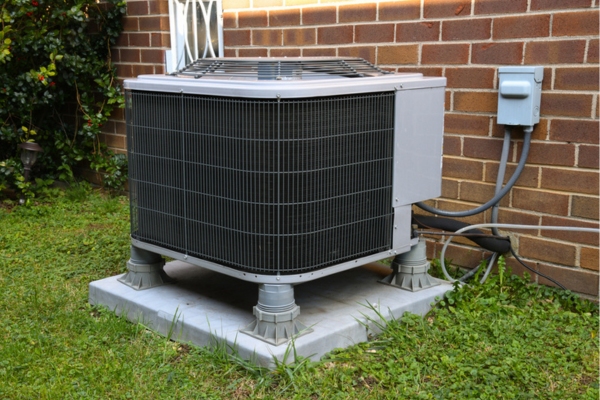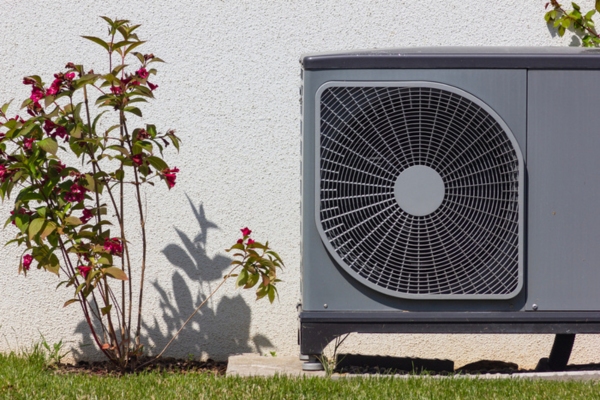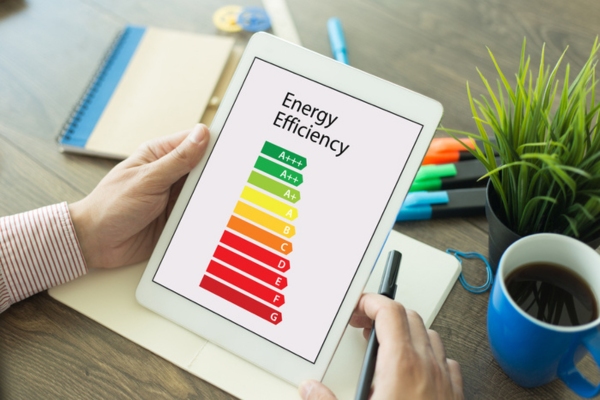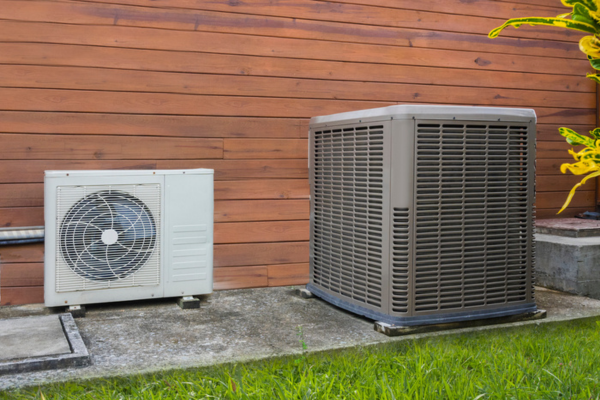Table of Contents
Effective heating and cooling solutions, including the choice between air conditioners vs. heat pumps, are essential in today’s quest for home comfort. As outdoor temperatures vary widely, ensuring a stable indoor atmosphere is crucial. This article from Lake Region Energy explores the essential functions and critical differences between these two popular choices. We aim to clearly outline how air conditioner vs. heat pump compare and contrast, allowing homeowners to choose the option that best meets their specific climate control requirements.
Understanding Air Conditioners

An air conditioner pulls heat out of a room and releases it outdoors, cooling the interior air. It helps keep living spaces at a pleasant temperature while lowering humidity in homes and business settings. This system operates using a refrigeration cycle. Here, a chemical refrigerant absorbs heat to circulate through a series of coils and compressed before being expelled outside.
Keep your home comfortable year-round with expert HVAC services from Lake Region Energy. Contact our team of experts today!
Components and Types of Air Conditioners
The primary elements of an air conditioning system are the compressor, which increases the refrigerant pressure to transport heat; the evaporator coil, which absorbs indoor heat; and the condenser coil, which releases the heat outside. Air conditioners are available in various models to accommodate different installation requirements and spatial constraints:
- Central Air Conditioners: Perfect for cooling multiple rooms or an entire building, these systems operate through a network of ducts.
- Ductless Mini-Split Air Conditioners: These provide localized cooling in specific areas or rooms without requiring extensive ducts, making them ideal for targeted temperature control.
- Window Units: These compact models can fit into standard window frames.
Exploring Heat Pumps
A heat pump is a multifunctional system capable of heating and cooling an indoor area. This system distinguishes itself from conventional heating systems by transferring heat rather than producing it through combustion, offering a more energy-efficient method for managing indoor climates.
In the summer, it functions similarly to an air conditioner by removing heat from the interior of a building and releasing it outdoors. Conversely, during the colder seasons, it reverses its operation by extracting heat from the outdoor air to heat the indoor environment.
Components and Varieties of Heat Pumps

Critical components of a heat pump system include:
- The compressor drives the refrigerant throughout the system.
- Evaporator and condenser coils interchange functions depending on whether the unit is set to heat or cool.
- The refrigerant is essential for transporting heat throughout the system.
Heat pumps are generally divided into two main categories: air-source and ground-source. Air-source heat pumps are widely used to exchange heat between indoor and outdoor air. Ground-source (or geothermal) heat pumps leverage the consistent temperatures underground to provide efficient heating and cooling solutions, though they require a more significant upfront investment.
Distinctive Features of Air Conditioners and Heat Pumps
Recognizing the fundamental distinctions between air conditioners and heat pumps is essential for homeowners to select the most suitable system.
Cooling vs. Heating
Air conditioners are specifically engineered to cool environments, which makes them perfect for areas with hot, humid weather. Conversely, heat pumps can heat and cool by reversing their cycle, making them a flexible option for places that experience moderate climate variations.
Reversible Functionality and Energy Efficiency

Heat pumps have the unique capability to reverse their operational mode, enabling both heating and cooling, unlike traditional air conditioners, which only cool. Thanks to their heat transfer method, their energy-efficient performance complements this versatility. Heat pump energy efficiency is quantified using SEER and HSPF ratings for cooling.
Make sure your home’s HVAC system is ready for any season with professional care from Lake Region Energy. Call us today!
Suitable Climates and Economic Factors
Air conditioners excel in regions that experience persistent, intense heat, making them ideal for such climates. In contrast, heat pumps are most effective in areas with mild winters. The initial cost of heat pumps, especially those of the ground-source variety, can be higher due to the complexity of their installation. Nonetheless, they tend to have lower operational costs, which can mean significant savings over time in suitable settings.
Similarities Between Air Conditioners and Heat Pumps

Air conditioners and heat pumps operate similarly. Both utilize a refrigerant and operate based on a similar cycle to transfer heat, effectively cooling an area by removing the warmth from indoors. This function is crucial whether the system is used for cooling or, in the case of heat pumps, also for heating.
Both types of systems also require regular maintenance to ensure they perform efficiently and have an extended operational life. Regular check-ups help maintain their efficiency and prolong their usability.
Furthermore, programmable thermostats and other energy-efficient accessories can significantly benefit air conditioners and heat pumps. These tools enhance efficiency and reduce energy use, meeting contemporary energy standards and homeowners’ expectations.
Deciding Between an Air Conditioner and a Heat Pump
When choosing between an air conditioning unit and a heat pump, several factors must be considered to match the user’s specific needs and conditions. Climate is critical in this decision; air conditioners are ideal for areas that experience consistently high temperatures and minimal seasonal changes. On the other hand, heat pumps are best suited for regions with milder winters and moderate overall temperatures.
Budget considerations are also paramount, as the upfront investment for heat pumps, particularly geothermal types, tends to exceed traditional air conditioners. Despite the higher initial expense, heat pumps can reduce operational costs over time due to their superior energy efficiency.
Homeowners should also factor in their energy efficiency objectives. Heat pumps typically deliver enhanced efficiency because they transfer heat rather than generate it, making them an attractive option for individuals focused on minimizing their environmental impact and lowering their energy expenditures.
A home’s specific heating and cooling requirements should also influence the decision-making process; for instance, if heating is just as critical as cooling, a heat fire pump might be preferable. Ultimately, consulting with HVAC professionals is recommended for tailored guidance. These experts can offer valuable insights tailored to the structural characteristics of the home, the efficiency of existing systems, and local weather patterns. They also ensure that the system is correctly installed for optimal performance.
Experience optimal comfort with professional heating and cooling system solutions by Lake Region Energy. Contact us today!
Conclusion
Although air conditioners and heat pumps operate on a refrigerant-based heat transfer cycle and necessitate routine maintenance, they cater to distinct requirements: air conditioners are solely for cooling and best suited to hot environments, while heat pumps offer the versatility of both heating and cooling, making them ideal for regions with mild, moderate temperatures.
Whether you’re considering an air conditioner vs. heat pump, selecting the appropriate system is essential for enhancing home comfort, optimizing energy efficiency, and minimizing ongoing energy expenses. We recommend contacting Lake Region Energy for specialized advice, considering your unique environmental and structural conditions. The expert team at Lake Region Energy is equipped to guide you through these decisions and manage the installation process, ensuring your chosen system operates at its best.
Contact Lake Region Energy for Premier HVAC Services
Lake Region Energy is your go-to resource if you’re seeking the best heating and cooling solutions in Maine and New Hampshire. Our team consists of expertly trained and professionally certified technicians skilled in various HVAC services—from essential tune-ups and repairs to complete system installations and upgrades. At Lake Region Energy, we are dedicated to providing exceptional care and service to your HVAC system.
Lake Region Energy is committed to delivering top-quality, affordable heating and cooling services. Our maintenance services are designed to enhance home comfort and boost system energy efficiency, reducing your heating and cooling costs. Whether you need repairs or a system replacement, we offer cost-effective solutions customized to meet your specific requirements, all with a guarantee of your satisfaction. Contact Lake Region Energy today for a complimentary in-home estimate or to schedule a service appointment.
For more information about our fuel deliveries and HVAC services, be sure to contact Lake Region Energy. You can click here to contact us, or you can call us at (207) 839-5500 to find out more. We offer a full line of heating and cooling repairs, maintenance services, and installations. Click the link to view our service area.

Related Articles:
- Surviving the Heat: Tips To Avoid Heat Exhaustion When Your Air Conditioner Fails
- Clearing the Air: Preventing Air Conditioner Mold for Healthier Cooling
- Cool Comfort: Architecture’s Evolution With Air Conditioning
- Air Conditioner’s SEER Rating: What You Need to Know
- Clearing the Air: Identifying Air Conditioner Smells Sources
